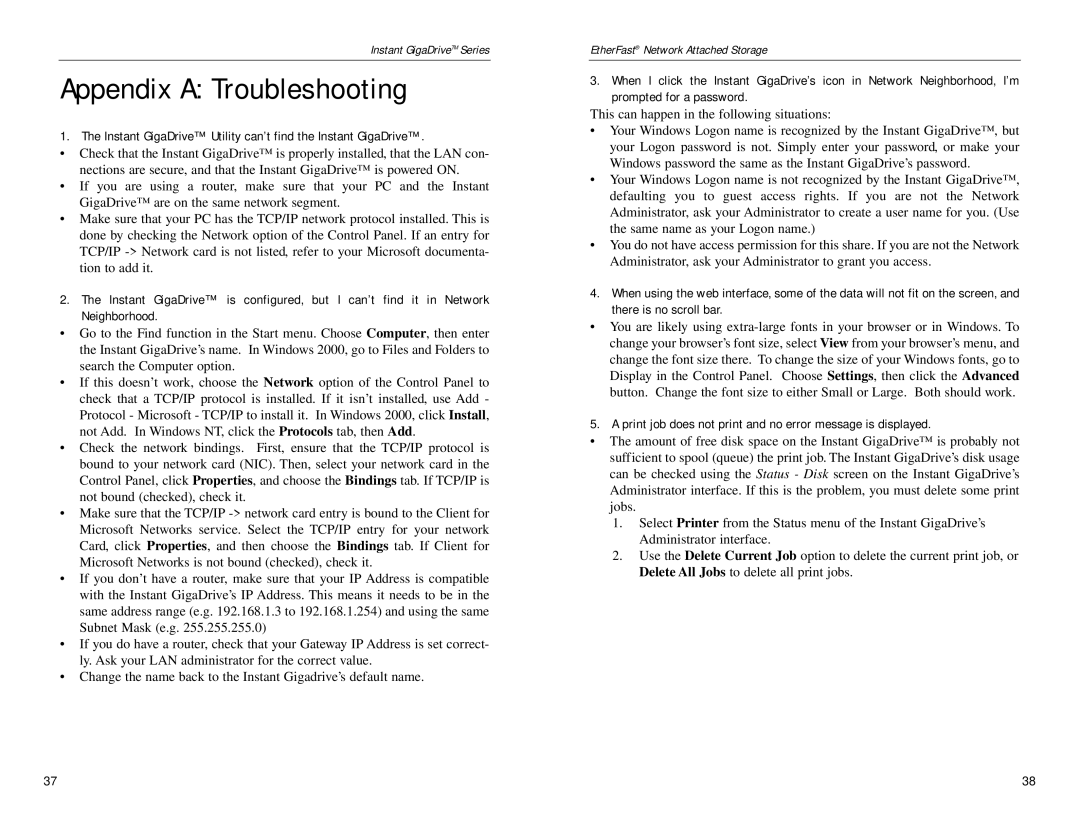Instant GigaDriveTM Series
Appendix A: Troubleshooting
1. The Instant GigaDrive™ Utility can’t find the Instant GigaDrive™.
•Check that the Instant GigaDrive™ is properly installed, that the LAN con- nections are secure, and that the Instant GigaDrive™ is powered ON.
•If you are using a router, make sure that your PC and the Instant GigaDrive™ are on the same network segment.
•Make sure that your PC has the TCP/IP network protocol installed. This is done by checking the Network option of the Control Panel. If an entry for TCP/IP
2.The Instant GigaDrive™ is configured, but I can’t find it in Network Neighborhood.
•Go to the Find function in the Start menu. Choose Computer, then enter the Instant GigaDrive’s name. In Windows 2000, go to Files and Folders to search the Computer option.
•If this doesn’t work, choose the Network option of the Control Panel to check that a TCP/IP protocol is installed. If it isn’t installed, use Add - Protocol - Microsoft - TCP/IP to install it. In Windows 2000, click Install, not Add. In Windows NT, click the Protocols tab, then Add.
•Check the network bindings. First, ensure that the TCP/IP protocol is bound to your network card (NIC). Then, select your network card in the Control Panel, click Properties, and choose the Bindings tab. If TCP/IP is not bound (checked), check it.
•Make sure that the TCP/IP
•If you don’t have a router, make sure that your IP Address is compatible with the Instant GigaDrive’s IP Address. This means it needs to be in the same address range (e.g. 192.168.1.3 to 192.168.1.254) and using the same Subnet Mask (e.g. 255.255.255.0)
•If you do have a router, check that your Gateway IP Address is set correct- ly. Ask your LAN administrator for the correct value.
•Change the name back to the Instant Gigadrive’s default name.
EtherFast® Network Attached Storage
3.When I click the Instant GigaDrive’s icon in Network Neighborhood, I’m prompted for a password.
This can happen in the following situations:
•Your Windows Logon name is recognized by the Instant GigaDrive™, but your Logon password is not. Simply enter your password, or make your Windows password the same as the Instant GigaDrive’s password.
•Your Windows Logon name is not recognized by the Instant GigaDrive™, defaulting you to guest access rights. If you are not the Network Administrator, ask your Administrator to create a user name for you. (Use the same name as your Logon name.)
•You do not have access permission for this share. If you are not the Network Administrator, ask your Administrator to grant you access.
4.When using the web interface, some of the data will not fit on the screen, and there is no scroll bar.
•You are likely using
5. A print job does not print and no error message is displayed.
•The amount of free disk space on the Instant GigaDrive™ is probably not sufficient to spool (queue) the print job. The Instant GigaDrive’s disk usage can be checked using the Status - Disk screen on the Instant GigaDrive’s Administrator interface. If this is the problem, you must delete some print jobs.
1.Select Printer from the Status menu of the Instant GigaDrive’s Administrator interface.
2.Use the Delete Current Job option to delete the current print job, or Delete All Jobs to delete all print jobs.
37 | 38 |
